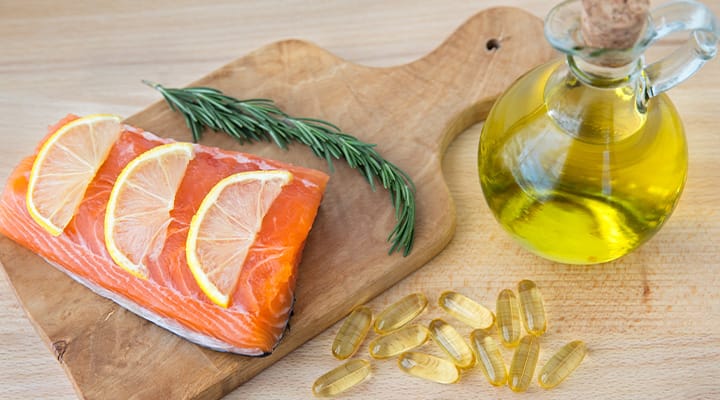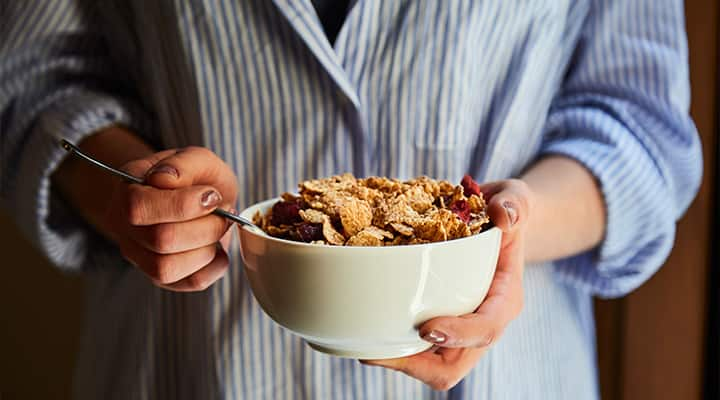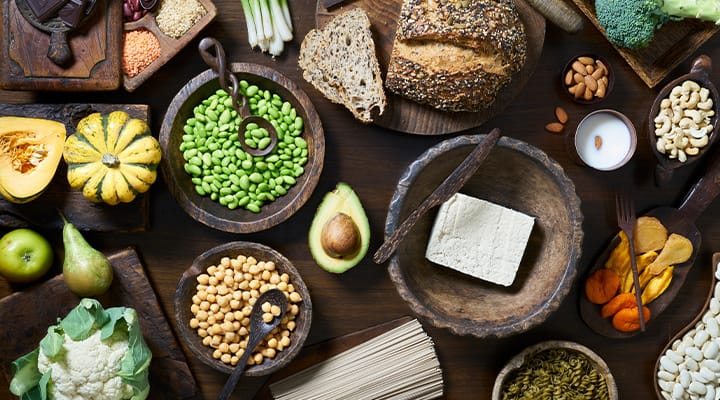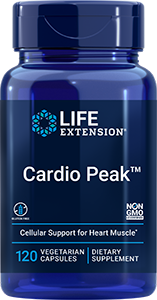
Top 10 Heart Health Supplements You Should Know About
Published: January 2024
Your heart is a vital organ—and keeping it healthy is, indeed, vital to your longevity. So what are you doing to keep the beat on a healthy heart? Hopefully, you're seeing your doctor regularly and following their advice, which we're going to guess includes a healthy diet and exercise (they don't call it "cardio" for nothing), avoiding stress, smoking and drinking, and keeping your weight in a healthy range.
But your heart health efforts don't have to end there. If you want to be even more proactive about your cardiovascular health, certain supplements may help. Fish oil, folic acid and vitamin K2 are some of the more popular ingredients, but they aren't the only ones.
Here's the scoop on the top 10 heart health supplements—plus tips for keeping your ticker in top shape!
What are heart health supplements?
Heart health supplements aim to provide you with important nutrients that you might not get from the food you eat—for example, omega-3 supplements benefit those who don't get this fatty acid from foods like fish and nuts—or that aren't easy to find in your diet, but can benefit your heart when taken in addition to all of your other healthy lifestyle choices.
So how do they work? In a nutshell, heart-friendly supplements work with your body to support your cardiovascular health in the following ways:
Promote vascular function:
Your body uses nutrients like taurine and omega-3s in fish oil to maintain already-healthy blood pressure.Encourage better blood flow:
Nutrients like magnesium help relax the smooth muscle to encourage healthy cardiovascular function and blood flow.Maintain healthy cholesterol levels:
Nutrients like fiber and omega-3s promote already-healthy LDL and HDL cholesterol levels.
What are the top 10 heart health supplements?
These 10 heart health supplements are instrumental in supporting your heart—and in many cases, the rest of you, too!
1. Fish oil
Fish oil is a popular supplement because it helps maintain already-healthy triglyceride, LDL & HDL cholesterol levels. Salmon, anchovies and sardines provide docosahexaenoic acid (DHA) and eicosapentaenoic acid (EPA)—omega-3 fatty acids in fish oil that support cardiovascular health by helping maintain already-healthy LDL and HDL cholesterol and triglyceride levels.
In addition, omega-3 fatty acids in fish oil are essential for your heart because they promote healthy blood flow and support already-healthy blood pressure. They also help inhibit inflammatory factors to promote whole-body health. Pro tip: If you prefer omega-3 gummies, look for products that are packed with EPA and DHA and are preferably sugar-free.
2. CoQ10
Coenzyme Q10, or CoQ10, is a molecule found in your heart, liver and other organs. CoQ10 provides critical support for mitochondria, which supports your cells' energy production. With this coenzyme, your cells can produce cellular energy and carry on with daily function.
While CoQ10 exists naturally in our bodies, enhancing cell energy production with a coenzyme Q10 supplement is a good way to promote heart health. Your heart needs plenty of energy to keep pumping, so CoQ10 helps to ensure your ticker has enough energy. Coenzyme Q10 may also benefit older adults, as experts say your CoQ10 concentrations decline as you age.
3. Taurine
Taurine is an amino acid in your large intestine that also is known for its energy benefits. Additionally, taurine processes bile and supports the immune system. Still, taurine might be best known for its heart-supporting qualities. This amino acid helps maintain already-healthy blood pressure, encourages healthy heart muscle contractions and supports muscle mass.
4. Fiber
While you may associate it with digestive health or even weight management, fiber is also renowned for helping your heart. It can be hard to eat enough fruits, vegetables, legumes and whole grains to get the fiber you need every day, so some choose to increase fiber intake by supplementing with glucomannan, a dietary fiber you get from the konjac plant. Incorporating this fiber daily supports heart health and helps maintain already-healthy blood sugar levels. A meta-analysis shows glucomannan fiber helped regulate already-healthy LDL and HDL cholesterol levels in subjects taking two or more grams of this fiber supplement.
5. Magnesium
If you want good health, you'll need magnesium throughout your body to support your muscles, bones and heart—they don't call it the mighty mineral for nothing! You can get magnesium through leafy green vegetables, nuts, milk and other tasty foods. When your magnesium intake is proper, you fortify your heart, mind and body.
Dietary supplementation is a dependable way to make sure you're getting the optimal amount of magnesium. This heart-healthy element is beneficial because it relaxes the smooth muscles within your blood vessels, thus promoting your cardiovascular health.
6. Vitamin K2
Vitamin K may not be as popular as vitamin C and D, yet it plays an important role in heart and bone health: it helps keep calcium in your bones, and out of your arteries. You will find vitamin K1 in dark, leafy greens, and vitamin K2 in cheese and similar dairy products high in fat. While dairy has saturated fat, K2 can be a part of a healthy diet for your heart—the key is to eat in moderation.
A vitamin K supplement is a good way to get the heart health benefits without the dietary fat. Past research has shown the benefits of vitamin K2 for your heart. A seven-year study examined nearly 5,000 participants and found better cardiovascular health in those with the highest vitamin K2 intake compared to those with the lowest.
Explore Our Best Heart Health Supplements
7. TMG
Your body produces trimethylglycine (TMG), a compound that helps you metabolize homocysteine. We need to have normal levels of homocysteine to maintain cardiovascular health, as unbalanced homocysteine can impact your health.
You can find TMG in foods like broccoli and spinach and also in TMG supplements. How does it work? Well, that's a bit of a science lesson: essentially, TMG provides extra methyl groups that allow your body to convert homocysteine, which you don't want too much of, to methionine, an essential amino acid and antioxidant that you need more of; it serves multiple purposes within the body.
If that's all Greek to you, just think of it this way: a healthy heart requires a body that's in harmony, and TMG can help!
8. Folate
Folate, or B9, is another essential B vitamin for your health. Your body can't produce folate, so it's important to get it from breakfast cereals, foods such as chickpeas and cabbage, and dietary supplements. Like TMG, folate helps maintain healthy homocysteine levels already within the normal range. Because B9 helps prevent excess homocysteine, it supports healthy levels of this important cardiovascular health biomarker.
9. Probiotics
Probiotics support your cardiovascular health by helping you maintain already-healthy cholesterol levels. While you might not realize it, probiotics are already a part of your diet if you eat yogurt and pickles. Heart-healthy fermented foods have been part of traditional diets for thousands of years.
So why do you need a probiotic supplement if you're an avid consumer of yogurt? Because foods don't contain a standardized, clinically studied amount of a specific strain of beneficial bacteria studied for its heart health benefits: Lactobacillus reuteri 3024. Heart health probiotics with this strain promote healthy levels of apoproteins, the molecules that compose cholesterol, and help maintain fibrinogen levels to support your cardiovascular wellness.
10. Olive leaf extract
Olive leaf extract is a heart-healthy supplement because it contains oleuropein, an olive oil compound with numerous health benefits, most notably support for already-healthy blood pressure, as seen in evidence-based studies. Olive oil in general is a great choice for heart health and a mainstay of the Mediterranean diet, but the great thing about a standardized extract is you know exactly how much of the beneficial compounds you are ingesting.
Honorable mention: Arjuna bark extract
While arjuna extract may not be as popular as fish oil or magnesium, if your goal is a healthy heart muscle, this supplement deserves a spot on your shelf. This lesser-known herb has been clinically studied for supporting the heart’s blood pumping capacity among healthy subjects and reducing general physical fatigue scores.
9 tips to support a healthy heart
A supplement is exactly what the word sounds like: a supplement, something extra to help support your heart-healthy lifestyle. What's most important is following these tips to keep your ticker in tip-top shape:
Eat balanced, nutrient-rich foods:
Choose your meals carefully, with an eye towards their nutritional content. For instance, seafood promotes heart health with its natural omega-3 fatty acids content. Whole grains and high-fiber foods also support cardiovascular health. Lean protein, colorful veggies and healthy fats (think extra virgin olive oil) are excellent starting points. If you're vegetarian, plant-based diets can benefit your heart as well, just don't skimp on omega-3-rich foods like nuts and avocado.Portion control:
You probably know to go easy on the burgers and fries. Too much of a good thing can be bad as well, though—make sure you're not overeating those healthy, balanced meals! Ensure your portions are appropriate for your dietary needs. Pro tip: Try hara hachi bu, a cornerstone in the Japanese diet that focuses on eating until you're 80% full.-
Regular exercise:
You don't need to be a "gym rat" to harvest the heart-friendly (and whole-body health) benefits of exercise. Finding exercises you enjoy doing is the first step to staying consistent. For example, swimming, cycling, walking and resistance training promote improved blood flow. Carve out 30 to 50 minutes a day, at least six days a week, and get your body moving. While cardio is great for your heart, resistance training, like weightlifting, helps you tone and maintain muscle mass. Pro tip: Start small. Work your way up to 50 minutes by starting with 10 to 15 minutes of daily exercise. -
Manage a healthy weight:
Maintaining a healthy body weight goes beyond looking good in your favorite jeans—it's essential for cardiovascular health. Excess weight can make your heart work harder, which could impact your health. (Get the right portions of heart-healthy foods and regular exercise, and you're more than halfway there!) -
Keep an even keel:
While physical health is essential, keeping your mental health in mind can also help your ticker stay healthy. Yoga, meditation and mindfulness are excellent ways to keep your cool, no matter what life throws your way. -
Test yourself:
Check on your health by getting annual lab tests. These examinations help you be proactive about maintaining cardiovascular health, making it easy to identify necessary lifestyle changes later in life. -
Prioritize uninterrupted sleep:
Uninterrupted sleep helps you control your stress levels, promotes peace of mind, and is associated with better overall health. -
Moderate alcohol intake:
We're not saying ditch your red wine full stop, but moderation is key. Overindulging can wreak havoc in your system, including cardiovascular health. So, be mindful when you enjoy your drink of choice—your heart will thank you! Pro tip: Try mocktails! They look and taste like fancy cocktails, but there's no alcohol in them, so they are a healthier choice for you and your ticker. -
Say goodbye to smoking:
When you smoke, you directly impact several aspects of your cardiovascular health, including blood oxygen levels, blood vessel function and blood pressure. Show your heart some love—pass on smoking.
About the Author: Beth Rush is a nutrition editor with more than five years of experience writing and editing articles covering topics like food justice, sustainable agriculture, and plant-based recipes. You can find Beth on Twitter @bodymindmag.
References
- Bertolo RF, McBreairty LE. "The nutritional burden of methylation reactions." Curr Opin Clin Nutr Metab Care. January 2013. https://pubmed.ncbi.nlm.nih.gov/23196816/
- Borsook ME, Borsook H. "Treatment of cardiac decompensation with betaine and glycocyamine." Ann West Med Surg. October 1951. https://pubmed.ncbi.nlm.nih.gov/14878414/
- Geleijnse JM, et al. "Dietary intake of menaquinone is associated with a reduced risk of coronary heart disease: the Rotterdam Study." J Nutr. November 2004. https://pubmed.ncbi.nlm.nih.gov/15514282/
- Hargreaves I, et al. "Disorders of Human Coenzyme Q10 Metabolism: An Overview." Int J Mol Sci. September 2020. https://pubmed.ncbi.nlm.nih.gov/32933108/
- Ho HVT, et al. "A systematic review and meta-analysis of randomized controlled trials of the effect of konjac glucomannan, a viscous soluble fiber, on LDL cholesterol and the new lipid targets non-HDL cholesterol and apolipoprotein B." Am J Clin Nutr. May 2017. https://pubmed.ncbi.nlm.nih.gov/28356275/
- Lee JE, et al. "Are dietary choline and betaine intakes determinants of total homocysteine concentration?" Am J Clin Nutr. May 2010. https://pubmed.ncbi.nlm.nih.gov/20219967/
- Morrison LM. "Results of betaine treatment of Atherosclerosis." The American Journal of Digestive Diseases. December 1952. https://link.springer.com/article/10.1007/BF02881126
- Perrinjaquet-Moccetti T, et al. "Food supplementation with an olive (Olea europaea L.) leaf extract reduces blood pressure in borderline hypertensive monozygotic twins." Phytother Res. September 2008. https://pubmed.ncbi.nlm.nih.gov/18729245/
- Susalit E, et al. "Olive (Olea europaea) leaf extract effective in patients with stage-1 hypertension: comparison with Captopril." Phytomedicine. February 2011. https://pubmed.ncbi.nlm.nih.gov/21036583/
- Ueland PM. "Choline and betaine in health and disease." J Inherit Metab Dis. February 2011. https://pubmed.ncbi.nlm.nih.gov/20446114/
- "Coenzyme C10." Data on file.
- "Vitamin K." Data on file.
Always be in the know!
Access the latest deals, wellness news, expert health tips & more!














